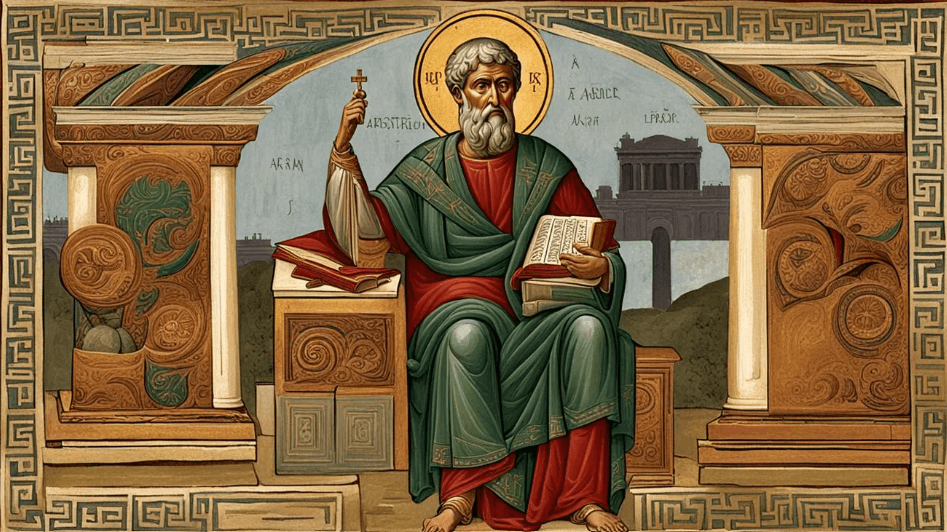Aristides of Athens, a 2nd-century Greek philosopher and the earliest known Christian apologist, authored the “Apology of Aristides.” Learn about his life, the discovery of his Apology, and its significance in early Christian literature. This post also explores his other attributed work, the “Epistle to Diognetus,” shedding light on the intellectual engagement of early Christians with their cultural milieu.

Aristides of Athens; Greek philosopher of the 2d century a.d., who was considered to be the first Christian apologist. His name is also spelled Aristeid.es. He was known as Aristides of Athens. Nothing is known about his life except that he taught philosophy at Athens and composed the earliest extant defense of Christianity, the Apology of Aristides. Written in Greek, the Apology may have been written to Emperor Antoninus Pius about 139.
The Apology was long considered lost, but in 1878 an edition of an Armenian fragment appeared at Venice. This was followed in 1889 by James Rendel Harris’ discovery of a complete Syriac version in a monastery on Mount Sinai. Publication of this translation at Cambridge, England, in 1891 led to the discovery that a Greek text of the treatise had existed for centuries in the religious romance Barlaam and Josaphat. Two portions of the Greek text were published in London in 1922 and 1924.
The Apology is brief, simple, and objective, but written in a lofty tone. It discusses the errors of Greeks, Chaldeans, Egyptians, and Jews concerning God, gives a summary of a seemingly primitive Christian belief, and emphasizes the righteousness of Christianity in contrast with the corrupt practices of paganism. Aristides seeks to demonstrate the reasonableness of Christianity by an appeal to facts.
Biography
Little is known about the life of Aristides, with the primary sources of information being the accounts provided by Eusebius of Caesarea and Saint Jerome. According to their records, Aristides was engaged in philosophical pursuits in Athens both before and after his conversion to Christianity. Eusebius, in his Ecclesiastical History, notes, “Aristides also, a devoted adherent of our faith, composed an Apology of the faith addressed to Hadrian.” Both Eusebius and Jerome mention that Aristides presented his Apology to Hadrian around the same time Quadratus delivered his own defense. This suggests that Aristides likely presented his Apology during the reign of Emperor Hadrian (117–138 AD), aligning with the theory that Aristides passed away between 133–134 AD. This timeline is further supported by the explicit language found in the Armenian version of the Apology. However, there is a discrepancy with the Syriac version, which states that the Apology was presented to Emperor Antoninus Pius in 140 AD. If taken to imply a personal delivery by Aristides, this would challenge the previously mentioned timeline. Some scholars suggest that Eusebius may have been mistaken, possibly due to Antoninus Pius using the name “Hadrianus” (Caesar Titus Aelius Hadrianus Antoninus Augustus Pius), leading to confusion. It has also been proposed that Jerome, who admitted to not having read the Apology, may have inadvertently perpetuated Eusebius’s error. Despite these discrepancies, Jerome confirms the existence of the Apology and provides insights into its contents. The accounts of Eusebius and Jerome, along with the Armenian version, strongly indicate that the Apology was indeed presented to Hadrian, likely around 124–125 AD.
Aristides’ Apology stands as the oldest extant Christian apologetic work up to the Contemporary Era. Other notable apologists of the 2nd century include Saint Justin the Martyr, Quadratus, Aristo of Pella, Tatian the Syrian, Miltiades, Apollinaris of Hierapolis, Athenagoras of Athens, Hermias, Theophilus of Antioch, and Melito of Sardis.
Aristides of Athens Writings
Aristides of Athens is primarily known for his work titled the “Apology of Aristides,” which is one of the earliest Christian apologetic writings to have survived. This Apology, addressed to the Roman Emperor Hadrian, provides a defense of Christianity and presents arguments for its truth and superiority over other belief systems of the time.
In addition to the “Apology of Aristides,” he is also credited with a work called the “Epistle to Diognetus.” However, it’s worth noting that there is some debate among scholars about whether the “Epistle to Diognetus” should be attributed to Aristides of Athens or to another early Christian author.
These writings are valuable because they provide insights into the early Christian community’s beliefs, practices, and interactions with the broader Roman society. They also demonstrate the intellectual engagement of early Christians with their cultural and philosophical milieu, as Aristides employs philosophical arguments and reasoning to defend and explain Christian beliefs.
Unfortunately, apart from these two works, none of Aristides’ other writings have survived to the present day. However, his “Apology” remains an important piece of early Christian literature and a testament to the efforts of early Christians to articulate and defend their faith in the context of the Roman Empire.